Description 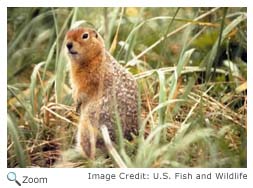 The Arctic ground squirrel has reddish fur on its face and sides and white specked gray to brown fur on its back. Its belly and the undersides of its legs are a light brown. It has white fur around its eyes and a short, bushy tail. It has strong front paws that are well adapted for digging and burrowing! The Arctic ground squirrel has reddish fur on its face and sides and white specked gray to brown fur on its back. Its belly and the undersides of its legs are a light brown. It has white fur around its eyes and a short, bushy tail. It has strong front paws that are well adapted for digging and burrowing!
Range
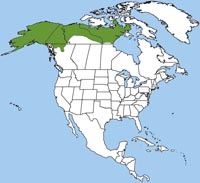 In the United States, the Arctic ground squirrel is found in Alaska. In Canada it is found in the Yukon Territory, northern British Columbia , and the mainland of the Northwest Territory.
The Arctic ground squirrel is also found in Siberia. In the United States, the Arctic ground squirrel is found in Alaska. In Canada it is found in the Yukon Territory, northern British Columbia , and the mainland of the Northwest Territory.
The Arctic ground squirrel is also found in Siberia.
Habitat
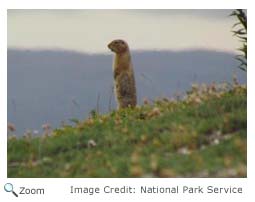 The arctic ground squirrel lives in alpine and arctic tundra in bushy meadows, riverbanks, lakeshores, and sandbanks.
They prefer areas with well-drained soil. This helps keep their undergound burrows free from flooding during heavy rains.They also prefer locations with good places for keeping watch for predators! The arctic ground squirrel lives in alpine and arctic tundra in bushy meadows, riverbanks, lakeshores, and sandbanks.
They prefer areas with well-drained soil. This helps keep their undergound burrows free from flooding during heavy rains.They also prefer locations with good places for keeping watch for predators!
Diet 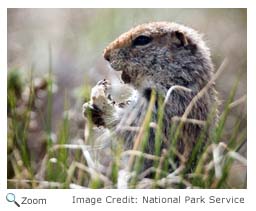 The Arctic ground squirrel is an herbivore. It eats a variety of plants including seeds, berries, willow leaves, mushrooms, grasses, and flowers. In the summer, it begins to store willow leaves, seeds, and grasses in its burrow. The Arctic ground squirrel hibernates in the winter and uses this store of food after it wakes up while it is waiting for spring plants to grow. The Arctic ground squirrel hibernates for up to seven months, from September through April. The Arctic ground squirrel is an herbivore. It eats a variety of plants including seeds, berries, willow leaves, mushrooms, grasses, and flowers. In the summer, it begins to store willow leaves, seeds, and grasses in its burrow. The Arctic ground squirrel hibernates in the winter and uses this store of food after it wakes up while it is waiting for spring plants to grow. The Arctic ground squirrel hibernates for up to seven months, from September through April. | |
Life Cycle 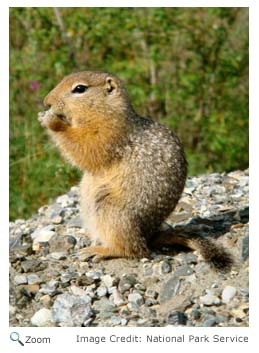 The Arctic ground squirrel mates in May. The female has five to ten babies. The babies are born blind and hairless in late June. The babies begin to grow hair after about eight days, and their eyes open after about twenty days. They leave the burrow to explore their surroundings after their eyes open. The babies are fully weaned by September and leave their mother to find or make a burrow of their own! The Arctic ground squirrel mates in May. The female has five to ten babies. The babies are born blind and hairless in late June. The babies begin to grow hair after about eight days, and their eyes open after about twenty days. They leave the burrow to explore their surroundings after their eyes open. The babies are fully weaned by September and leave their mother to find or make a burrow of their own!
Behavior 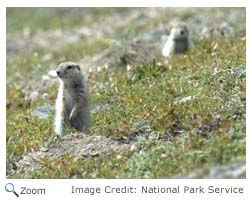 Arctic ground squirrels live in colonies of hundreds of squirrels. Each colony has a couple of dominant males that control the territory. Arctic ground squirrels are usually active between four in the afternoon and nine or ten at night. On rainy and cloudy days, they stay in their burrows. Arctic ground squirrels live in colonies of hundreds of squirrels. Each colony has a couple of dominant males that control the territory. Arctic ground squirrels are usually active between four in the afternoon and nine or ten at night. On rainy and cloudy days, they stay in their burrows.
An Arctic ground squirrel colony is made up of burrows that are dug about three feet under the ground. The burrows are connected with a series of tunnels. Brown bears often dig up a whole system of burrows up to just to catch the squirrels!
Arctic ground squirrels are very vocal. In fact, they are called "tsik-tsik" by the Inupiat Eskimos in Alaska because of the sounds they make!
|


 In the United States, the Arctic ground squirrel is found in Alaska. In Canada it is found in the Yukon Territory, northern British Columbia , and the mainland of the Northwest Territory.
The Arctic ground squirrel is also found in Siberia.
In the United States, the Arctic ground squirrel is found in Alaska. In Canada it is found in the Yukon Territory, northern British Columbia , and the mainland of the Northwest Territory.
The Arctic ground squirrel is also found in Siberia. 


